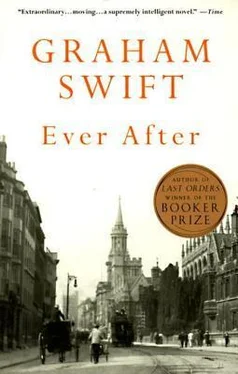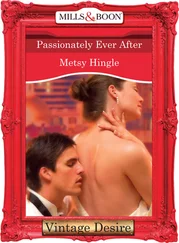And a boy it was. And I will never forget how her eyes sparkled, how we laughed, with the countryside rushing past us. And those words still ring in my ear: “I would rather admire than know.”
The green valley, the church, the ivied Rectory, the huddled cottages, the copse, loud with rooks, behind the churchyard. An image out of a picture book of ye olde England, but it still exists. I should go there, perhaps (in my condition?). A sort of pilgrimage. A legitimate piece of field research. I can imagine it. There will be chicken wire in the church porch to stop birds nesting — there always is. And there will be a little, charred, utilitarian enclave in one corner of the graveyard, with a heap of grass cuttings and discarded flowers and an ancient, rusted incinerator. There always is. And they will still be there. Or some of them. Not Matthew, of course. Nor the elder brothers. Nor Lucy. But the Rector, and Mrs Rector. And Elizabeth. Real people, real bones (not this cast of characters). And, with a headstone older than them all (the graves of infants are always affecting), Felix.
22nd April 1854:
Today, after falling ill of scarlet fever on Sunday night, our darling Felix died, beyond the doctor’s saving, at half-past six in the morning, aged one year and ten months.
I don’t understand him. I never sought him out, I could do without him. But there he is, washed up before me: I have to revive him.
I don’t understand him. The Notebooks don’t begin until 1854, with the death of his son. And they end in 1860, with the departure of Matthew from Burlford and from his wife and children for ever. And throughout that six-year period Matthew must have lived, to the world at least, the life he had always lived; must have ridden off every day over the hill to his work, and slipped into bed beside Elizabeth and sat with her in their pew on Sundays, as if nothing had changed.
The Notebooks must have been secret, even from the Rector, to whom his “thoughts” were not. The entries are sporadic — whole months go by with not a word written. And at any time during those six years (but how many times did he do this?) Matthew might have looked around him at all that he had and said, indeed, What is the difference? What difference does it make? And even on that very last day — it was a fine June day: he even found time to note the fleecy clouds and the roses in the Rectory garden — he might have walked up on to Jacob’s Hill, looked down at his house, at the village, at all that sweet, unaltering make-belief, and, with a simple turning of a switch inside him and a sealing of his lips, returned to embrace it.
22nd April 1855:
Is there not in our minds, no less than in physical nature, a power of regeneration and renewal? Are we not lopped and smitten only so we will grow again? I thought it so once. “Heaviness may endure for a night, but joy cometh in the morning.”
9th August 1856:
Such a lovely day, blessed day. Unbroken sunshine and the breeze not bringing in clouds but seeming to sweep and cleanse the air. In the evening, at the imprecations of Lucy, who seemed to decide that today she must be my constant consort, took the gig and made a brief excursion with her round and about the village. Such a sweet evening, such a rare light over the valley, and the tops of the trees in Rectory Copse stirring as if with a consciousness of delight. On such a day why should we resist what we credulously call the “evidence of our senses”? “And the firmament sheweth his handywork”! Coming back, Lucy fell at once fast asleep, even in the jolting gig. Had to be lifted, still sleeping, from it. Observed how in her sleep she passes the back of her hand deliberately across her eyes, just as her mother does. Thought how a future husband will treasure that gesture just as I treasure it in Liz. No thing, perhaps, is truly separate from another. What right have I to make hostages to my conscience my children, my wife and all that is dear to me? When I know, truly, I would lay down my life, on the instant, for my daughter and her brothers and their mother, why can I not do the lesser thing and make a sacrifice of my doubts?
24th October 1856:
Raise again with the good Rector the question of Extinction. N.B., not Death — Extinction. The Rector would have it that I confuse — because he himself, perhaps, confuses — the two, and that my discoursing on the latter is merely the old cavilling at the former. I am not so foolish as to take issue with mortality. I will bow to Divine Will — however volatile that Volition — in the individual (have I not done so?). But in the species?
These fossils of mine, quips he, are fast becoming the “insuperable bone of our contention.” But I will not be jested into submission. Question: Is the Creator to be viewed as a mere Experimenter? Why should the Maker who fashioned Noah, and gave him such provident instructions, make what he unmakes? He answers: Being the Creator, he would have every right. I answer: Yes, but what reason? He answers: Did not God repent of his Creation? Was not the Flood sent to punish all flesh with destruction, saving only the seedstock in the Ark? And might not these creatures (viz. “my fossils”) be the remains of those living things destroyed in the Flood, their shapes “monstrously altered” by that great Catastrophe? Answer: Anatomy not so flexible, nor distortion so uniform. And, in any case, “these creatures” were extinct (by any reckoning) before the Flood.
But he does not care to be launched again on the question of Time. He looks at me, indeed, with the scowl of a man who begins to feel I take up too much of his. Yet he once, not long ago, gave it freely enough. He was once not a little glad that, after some ten years his son-in-law, I opened up my thoughts to him and put him, in his words, “on his theological mettle.” We should not, he says, from the small vantage of our private grievances, call to task the universe and its governance. No, no, perhaps. But we regularly, it seems, do the opposite thing and suppose, from our private contentments and the smooth running of our local affairs, the compliant disposition of all things. Example: I am a surveyor; I go out with my yardstick to measure the field. I am told by Lyell here, whose Principles of Geology rests at my elbow and whom I do the credit of re-reading, this time with my eyes open , that the universe is a thing beyond all known calculation. No matter: in order to measure the field it is not necessary to measure the universe, and I will swear, for all Lyell can tell me, that the field I tread today, after diligently perusing his work, is the same field I trod yesterday and that three feet still make one yard.
25th October 1856:
If Lyell is right, and I cannot — without shutting my eyes — pronounce him wrong, then the Book of Genesis is not a history but an allegory — and an imperfect one — and my father’s frail chronometers are of little avail in estimating the immense periods of Geological Time. Suppose that aeons elapsed before the Creator made Man, before the world became such as we see it to be, and that the six days of Genesis are properly to be counted in millions of years; then the entire record of human history is as a wink in the world’s duration. And if the world existed so long without Man upon it, why should we suppose that futurity holds for us any guaranteed estate and that we occupy any special and permanent place in Creation?
29th October 1856:
Walked with the Rector before dinner over Jacob’s Hill. Fine autumn weather, the bracken turning. Ventured — with caution — to raise again above questions. Answers: Bah! Who but the Almighty could have raised mountains and levelled plains? I answer: Lyell could tell him. Offer to lend copy.
Читать дальше












